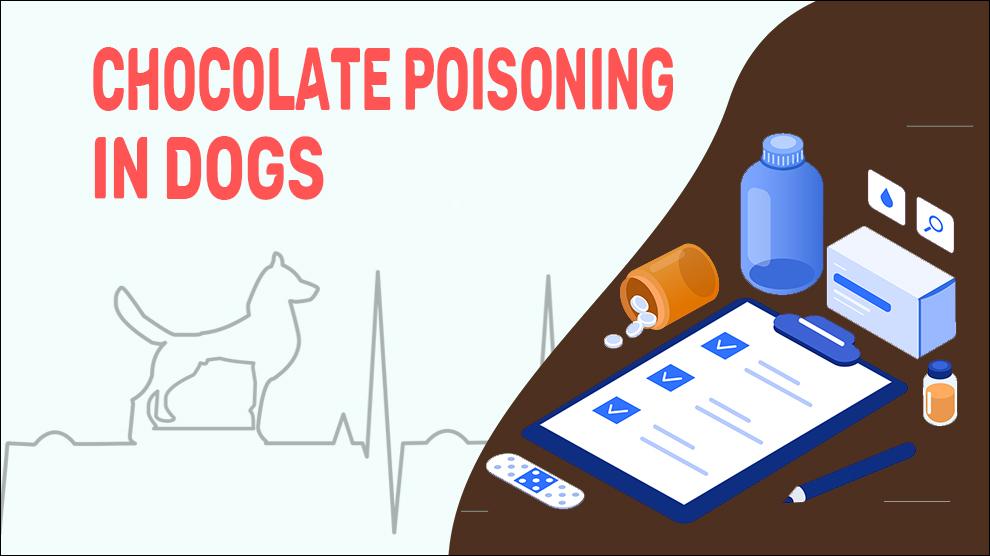What Is Chocolate Poisoning In Dogs?
Chocolate is a delicious treat enjoyed by many people around the world, but it can be harmful to dogs.
Chocolate contains a compound called theobromine, which is toxic to dogs. When dogs consume chocolate, the theobromine can cause a variety of symptoms and can even be fatal in some cases. This condition is known as chocolate poisoning.
Chocolate poisoning is a serious condition that can be fatal in some cases. If you suspect that your dog has consumed chocolate, it is important to seek veterinary care immediately.
Symptoms Of Chocolate Poisoning In Dogs
The symptoms of chocolate poisoning in dogs can range from mild to severe, and can include:
- Vomiting
- Increased heart rate
- Diarrhea
- Hyperactivity
- Rapid breathing
- Tremors
- Seizures
- Coma
If you notice any of these symptoms in your dog after they have ingested chocolate, it is important to seek veterinary care immediately.
Treatment Options For Chocolate Poisoning In Dogs
The treatment for chocolate poisoning in dogs will depend on the severity of the symptoms and how much chocolate was consumed.
In some cases, the dog may need to be hospitalized for supportive care, including intravenous fluids and medications to control seizures and other symptoms.
If the dog has only consumed a small amount of chocolate, the veterinarian may induce vomiting to remove the chocolate from the stomach.
They may also administer activated charcoal to absorb any remaining theobromine in the dog's system. In severe cases, the dog may need to be treated with medications such as benzodiazepines or barbiturates to control seizures and other symptoms.
In rare cases, dogs with chocolate poisoning may require blood transfusions to replace lost fluids or treat anemia.
Home Remedies For Chocolate Poisoning In Dogs
There are no home remedies that can cure chocolate poisoning in dogs.
However, there are some things you can do at home to help alleviate symptoms and support your dog's recovery:
Activated charcoal: Activated charcoal can help absorb any remaining toxins in your dog's system. It is important to follow your vet's instructions when administering activated charcoal.
Bathing: If your dog has gotten chocolate on their fur or skin, you can bathe them with mild shampoo to remove any traces of chocolate.
Rest: Rest is important for dogs recovering from chocolate poisoning. Keep your dog calm and comfortable and limit their activity until they have fully recovered.
It is important to remember that while these home remedies may provide some relief, they should not be used in place of veterinary care. Chocolate poisoning can be a serious and potentially fatal condition, and prompt treatment is necessary to help your dog recover.
How To Prevent Chocolate Poisoning In Dogs?
Preventing chocolate poisoning in dogs involves keeping chocolate products out of reach and supervising dogs when they are around chocolate.
It is also important to educate family members and guests about the dangers of feeding chocolate to dogs. If you have a dog that is prone to getting into things, it may be helpful to keep them in a crate or separate room when you are not able to supervise them.
Additionally, you can consider using child-proof latches on cabinets to keep chocolate and other dangerous items out of reach.
Affected Dog Breeds Of Chocolate Poisoning
All dogs are susceptible to chocolate poisoning, but smaller dogs and puppies may be more sensitive to the effects of theobromine due to their size and weight.
Additionally, certain breeds such as pugs, bulldogs, and boxers may be more prone to developing chocolate poisoning due to their respiratory issues and other health problems.
Causes For Chocolate Poisoning In Dogs
Causes:
The primary cause of chocolate poisoning in dogs is the consumption of chocolate. Theobromine, the toxic compound found in chocolate, is metabolized much more slowly in dogs than in humans.
This means that even small amounts of chocolate can be toxic to dogs, especially if they are smaller or more sensitive breeds.
Other factors that can contribute to chocolate poisoning in dogs include:
- Access to chocolate products in the home
- Lack of supervision
- Curiosity and exploratory behavior in puppies and younger dogs
When To See A Vet For Chocolate Poisoning In Dogs?
If you suspect your dog has consumed chocolate, it is important to seek veterinary care immediately. The sooner your dog receives treatment, the better the chances for a positive outcome.
Symptoms of chocolate poisoning can worsen quickly and can lead to serious complications, such as seizures and cardiac arrest.
The vet will likely induce vomiting to remove any remaining chocolate from the stomach and may administer activated charcoal to absorb any remaining toxins.
They may also provide supportive care, such as IV fluids and medications to control seizures or heart rate.
Food Suggestions For Chocolate Poisoning In Dogs
The best way to prevent chocolate poisoning in dogs is to keep all chocolate and cocoa products out of their reach.
If your dog does consume chocolate, there are some things you can do at home to help alleviate symptoms and support their recovery:
Hydration: Provide your dog with plenty of fresh water to help flush out its system.
Small, bland meals: Offer your dog small, frequent meals of a bland diet, such as boiled chicken and rice, to help soothe their upset stomach.
Probiotics: Probiotics can help support your dog's digestive system and promote healthy gut bacteria. Talk to your vet about which probiotics may be beneficial for your dog.
Conclusion
Chocolate poisoning in dogs can be a serious and potentially life-threatening condition. It is important to seek veterinary care immediately if you suspect your dog has ingested chocolate.
The best way to prevent chocolate poisoning is to keep all chocolate and chocolate-containing products out of your dog's reach. By taking these precautions, you can help to keep your dog safe and healthy.

















